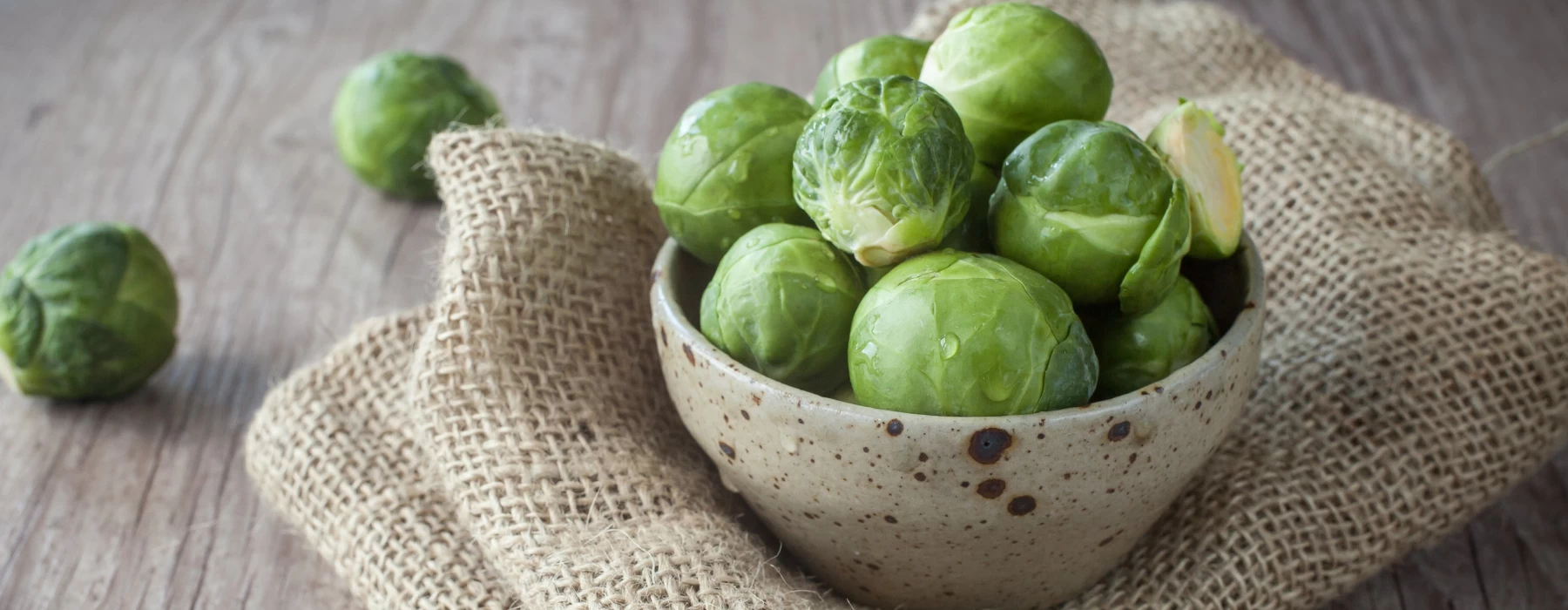
Brussels sprouts belong to the cruciferous family and resemble mini cabbages. Typically, they are cut, cleaned, and cooked to make a nutritious dish. Brussels sprouts have an impressive nutrient profile. Nutritional facts of Brussels sprouts per half cup (78 grams):
|
Calories |
28 |
|
Protein |
2 grams |
|
Carbs |
6 grams |
|
Fiber |
2 grams |
|
Vitamin K |
137% of RDI |
|
Vitamin C |
81% of RDI |
|
Vitamin A |
12% of RDI |
|
Folate |
12% of RDI |
|
Manganese |
9% of RDI |
Brussels sprout has a wide range of antioxidants. These compounds reduce oxidative stress and lower the risk of chronic diseases. According to a study, consumption of 2 cups of Brussels sprouts per day was linked to a decrease of 28% in oxidative stress. Brussels sprouts are especially high in antioxidant kaempferol. Test-tube studies have shown that kaempferol can reduce the growth of cancer cells and can also reduce inflammation and improve heart health.
According to some studies, antioxidants present in Brussels sprouts can help protect against certain types of cancer. In another study, consumption of Brussels sprouts was linked with increased detoxification enzymes by 15-30%. Researchers hypothesize that this increase in the level of detoxification enzymes leads to decreased risk of colorectal cancer. However, more research is needed to justify this. The antioxidants present in Brussels sprouts reduce the oxidative stress which contribute to diseases like cancer. So, eating Brussels sprouts daily along with a balanced diet and healthy lifestyle can reduce the chances of cancer, but more research is needed.
Brussels sprouts are rich in fiber. Only half a cup of it contains 2 grams of fiber. Consumption of fiber is linked with regular bowel movement. Fiber also promotes the growth of gut healthy bacterias. Increased intake of fiber is linked with improved blood sugar levels and reduced risk of heart disease.
Brussels sprouts are excellent in vitamin K content. Half cup of Brussels sprouts provides 137% of RDI for vitamin K. Vitamin K is essential for blood coagulation to stop bleeding. Vitamin K also helps in bone growth and protects against osteoporosis. If you are on a blood thinning medication, you should moderate the intake of vitamin K.
Several studies have linked the increased intake of cruciferous vegetables with decreased risk of diabetes. It may be due to the high fiber content of Brussels sprouts, which keeps regulating blood sugar levels. Brussels sprouts also contain alpha-lipoic acid. It is an antioxidant which is linked with potential effects on blood sugar and insulin levels in several studies. Daily intake of Brussels sprouts in addition to a healthy balanced diet will help keep your blood sugar levels under control.
Brussels sprouts are a good source of ALA omega-3 fatty acids. Those who don’t eat seafood, Brussels sprouts are a good option for them. ALA is converted to more active forms, omega-3 fatty acids in the body, but in limited quantities. For this reason, ALA should be consumed in greater amounts to meet daily omega-3 fat needs. Brussels sprouts are one of the best plant sources for ALA. Intake of omega-3 fatty acids is linked with reduced blood triglycerides, slow cognitive decline, reduced insulin resistance, and decreased inflammation in several studies. Inflammation is a natural immune response, but chronic inflammation can lead to diabetes, heart disease, and cancer. According to some test-tube studies, the compounds present in cruciferous vegetables, including Brussels sprouts have anti-inflammatory properties. Brussels sprouts are packed with decent amounts of antioxidants. These antioxidants are involved in neutralization of free radicals which can cause inflammation. Kaempferol, the main antioxidant found in Brussels sprouts, has especially excellent anti-inflammatory properties.
1 serving of Brussels sprouts (half cup) provides 81% of the RDI for vitamin C. Vitamin C is essential for performing several tasks in the body, including growth and repair of tissues, production of protein like collagen, works as antioxidant, and enhances immunity. Vitamin C is essential for the absorption of non-heme iron (iron from plant source). According to a study, 100 mg intake of vitamin C with a meal can increase the absorption of iron upto 67%. Although vitamin C is found in many fruits and vegetables, Brussels sprouts is one of the best vegetable source for it. Addition of Brussels sprouts, few times a week can help you in production of collagen proteins, growth, repair, and proper absorption of iron.
Most importantly, Brussels can be easily incorporated into any diet. You can enjoy them roasted, boiled, sauteed, or baked.